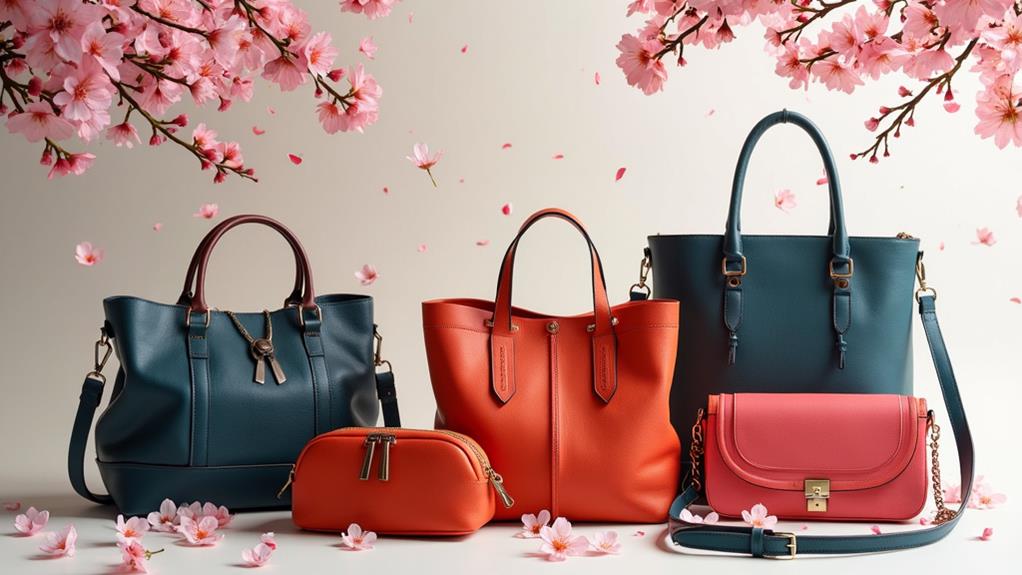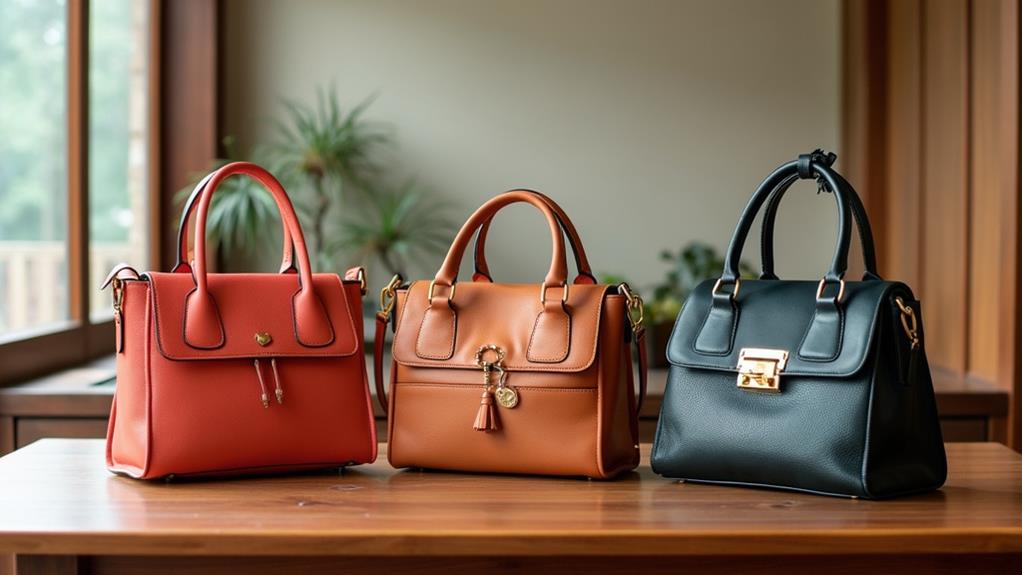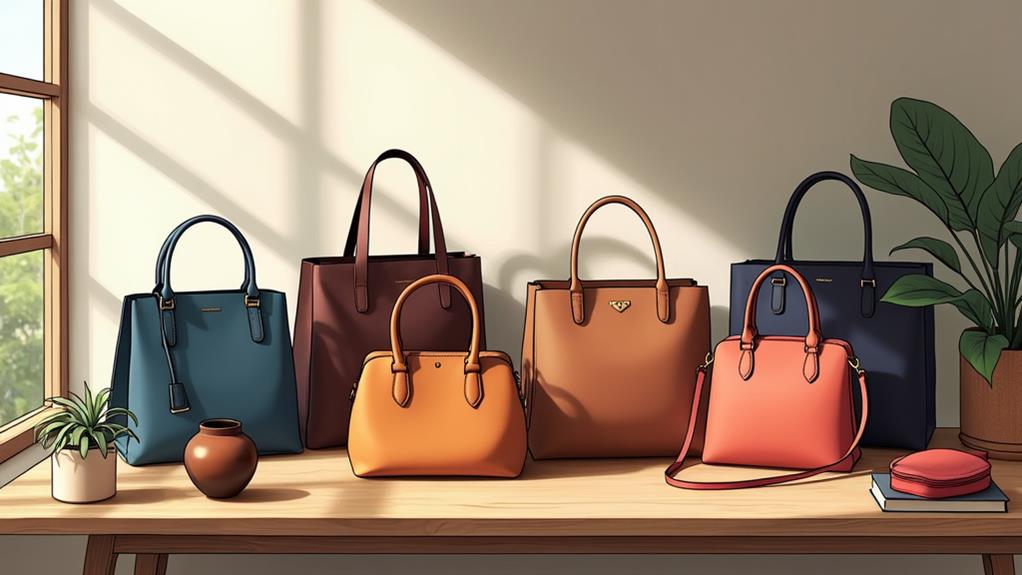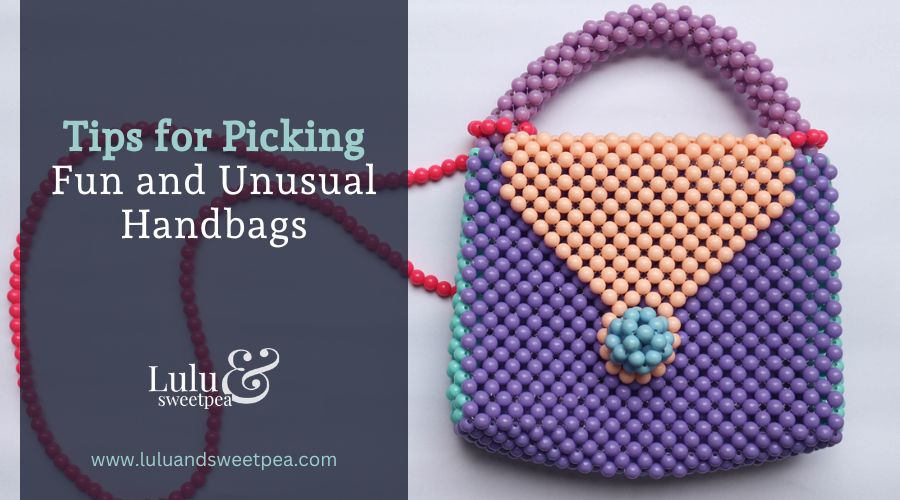The Rise of Japanese Luxury Handbags in Global Fashion
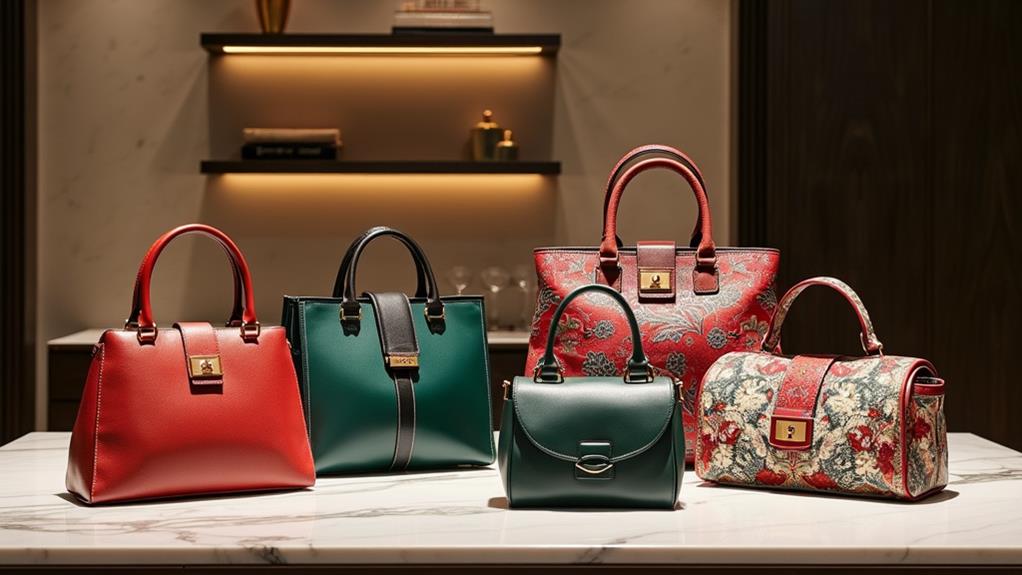
Japanese luxury handbags have become increasingly prominent in the global fashion scene. But what makes them so appealing? It's not just the meticulous craftsmanship or the cultural significance imbued in each piece.
These handbags offer a unique blend of innovation and tradition that distinguishes them from Western counterparts. Competitive pricing and a robust second-hand market also contribute to their growing popularity.
Interested in how Japanese aesthetics are shaping global fashion trends? There's much more to explore.
Cultural Values and Quality
In Japan, the cultural emphasis on meticulous care and respect for possessions means you'll often find second-hand luxury handbags in excellent or like-new condition. This deep-rooted value is evident in how Japanese consumers handle their belongings.
When you explore the second-hand market in Japan, you'll discover that the quality of luxury goods is exceptionally high, offering a shopping experience that's difficult to match elsewhere.
The Japanese commitment to quality and craftsmanship extends beyond new items into the resale market, where pre-owned luxury handbags retain their original allure. This isn't just about physical condition; it's about preserving the authenticity and inherent value of each piece.
When you purchase a pre-owned handbag in Japan, you're not merely buying an item; you're investing in a piece of art that has been cared for with the utmost regard.
These cultural values contribute to a thriving second-hand market, appealing to both local and international buyers. The emphasis on authenticity and quality ensures that the luxury goods you find are genuine and well-maintained, making Japan a trusted destination for collectors worldwide.
Authentication and Trust
When buying luxury handbags, trust and authenticity are paramount. Investing in Japanese luxury bags offers peace of mind due to Japan's stringent regulations against counterfeit goods. Sellers in Japan adhere to rigorous authentication processes, making it a trusted destination for collectors seeking genuine designer pieces, especially preowned designer bags.
Japanese sellers often provide proof of authenticity, such as certificates or detailed images, which boosts trust and greatly reduces the risk of scams. Indicators like watermarks or minor stains can serve as signs of authenticity, supported by Japan's strict copyright and designer goods regulations.
Additionally, Japan's cultural emphasis on careful maintenance and respect for possessions means a well-cared-for bag from Japan is highly likely to be authentic. You can trust that these preowned designer bags have been treated with the utmost respect and care.
Japan's commitment to authentication and trust sets it apart in the global luxury handbag market, offering you peace of mind with every purchase.
Diverse Selection
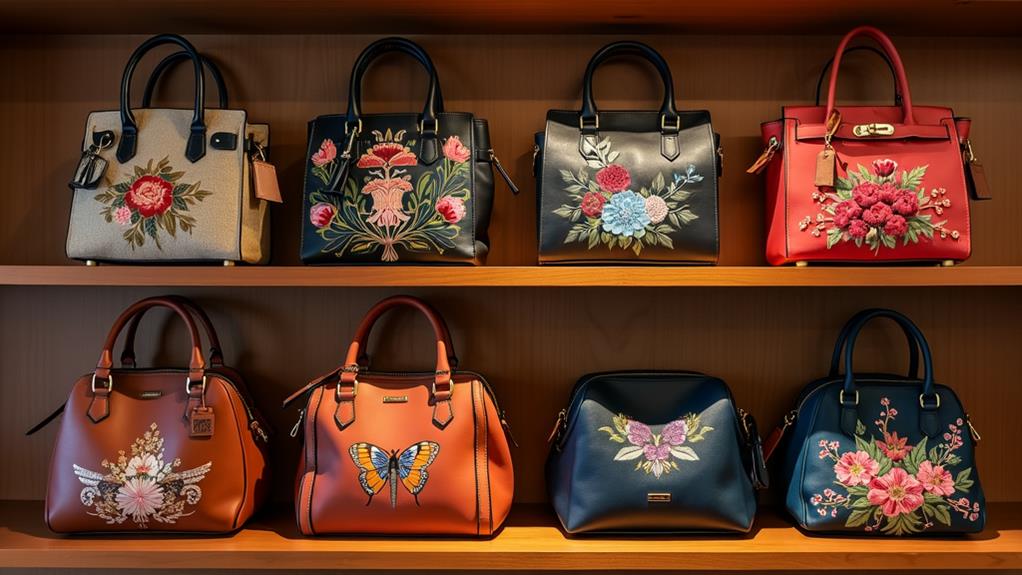
Japan's second-hand luxury handbag market offers an extensive selection that caters to diverse tastes and preferences. From top brands like Chanel, Louis Vuitton, and Hermès, you'll find a wide range of styles.
Whether you're searching for a rare limited-edition piece or a discontinued item, Japan's market provides a unique shopping experience. Japanese retailers often offer exclusive Japan-only designs, adding another layer of uniqueness to your purchase.
These exclusive items mean you can acquire luxury handbags unavailable anywhere else. The constant turnover of luxury items among Japanese consumers ensures a fresh and diverse inventory, keeping the market dynamic and exciting for both local and global fashion enthusiasts.
In addition to contemporary designs, you'll also discover vintage pieces that reflect Japan's rich fashion history. These high-quality, authentic bags are ideal for collectors or anyone seeking timeless additions to their wardrobe.
With such a rich array of options, Japan's second-hand market is a premier destination for luxury handbag shopping, offering an unparalleled selection that caters to all tastes.
Competitive Pricing
While Japan's diverse selection of luxury handbags is impressive, it's the competitive pricing that truly sets the market apart. Luxury second-hand bags in Japan often cost significantly less than in many Western countries, making it an attractive destination for budget-conscious shoppers seeking high-end items without overspending.
A key factor behind this competitive pricing is Japan's lower import taxes, which contribute to the affordability of luxury goods. Consignment stores and online platforms in Japan frequently offer better deals on pre-owned luxury bags compared to traditional retail prices. This dynamic benefits both buyers and sellers, as it encourages fair pricing and ensures a mutually advantageous transaction.
Additionally, the influx of foreign visitors taking advantage of favorable exchange rates has further driven down prices for luxury handbags. As more tourists flock to Japan for its shopping opportunities, the market becomes increasingly competitive, enhancing Japan's appeal as a premier shopping destination.
Ultimately, the competitive pricing of luxury second-hand bags in Japan makes it a haven for those looking to enjoy high-quality fashion without the hefty price tag.
Customer Service Excellence
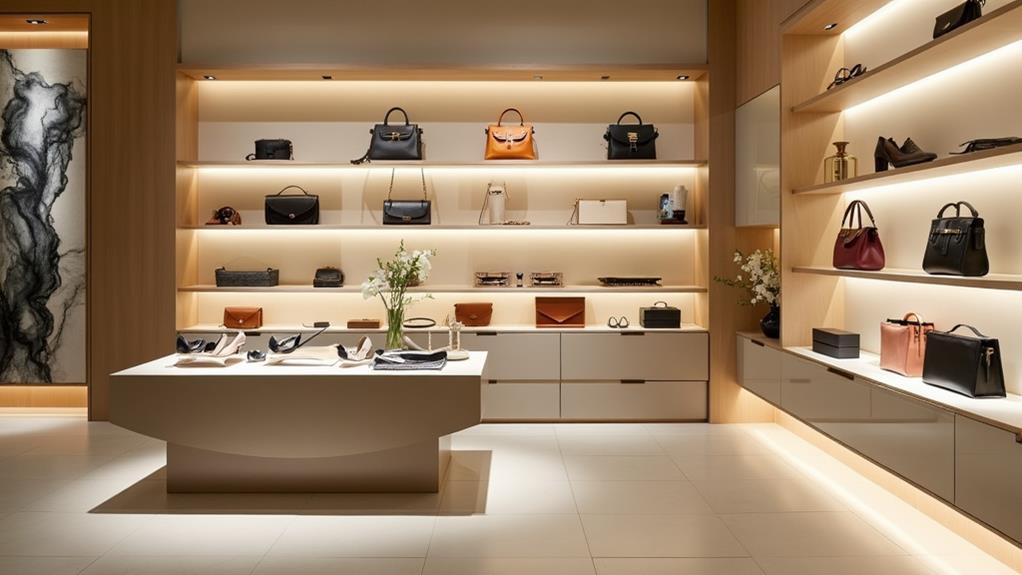
Experiencing unparalleled customer service is one of the defining aspects of shopping for luxury handbags in Japan. From the moment you step into a store, attentive and polite staff ensure your shopping experience is exceptional. Japanese retailers understand the importance of customer service and exhibit a deep knowledge of luxury brands, making it easy to find the perfect handbag.
| Feature | Description |
|---|---|
| Personalized Assistance | Staff guide you through selections to find items that suit your tastes. |
| Worldwide Shipping | Many consignment shops offer international shipping for added convenience. |
| Loyalty Programs | Retailers provide perks like shipping discounts through platforms such as ZenMarket. |
The commitment to authenticity and customer satisfaction is evident in every interaction. Staff in Japan go above and beyond to create a welcoming atmosphere, ensuring your needs are met with precision. They often offer personalized assistance, helping you navigate the vast selection of luxury handbags to find items that perfectly match your style.
Moreover, many luxury consignment shops in Japan provide worldwide shipping, making the shopping experience seamless for international customers. Retailers also implement loyalty programs and perks, such as shipping discounts, to further enhance your shopping experience. By prioritizing customer service, Japanese luxury brands have set a high standard, making each purchase a memorable event.
Investment Value
Let's delve into the investment value of Japanese luxury handbags. Pre-owned luxury bags from Japan are often in pristine condition due to meticulous care and high-quality materials, making them a smart investment for fashion enthusiasts.
Here's why investing in Japanese luxury handbags is a wise choice:
- High Resale Value: Brands like Chanel, Louis Vuitton, and Hermès are highly desirable among collectors. Well-maintained Japanese luxury bags often command impressive prices in the resale market.
- Competitive Pricing: Luxury second-hand bags in Japan are generally priced lower than those in Western markets. This allows you to acquire prestigious designer items at more accessible prices, enhancing your investment portfolio.
- Market Growth: The Japanese second-hand luxury goods market is projected to grow from approximately $3.97 billion in 2023 to $5.84 billion by 2028. This growth underscores the strong investment potential in pre-owned luxury items.
- Unique Designs: Japan-exclusive designs and rare, limited-edition pieces are highly sought after by global collectors. These unique items increase their investment appeal and can yield significant returns.
Investing in Japanese luxury handbags combines style with financial prudence.
Shopping and Authenticity Verification
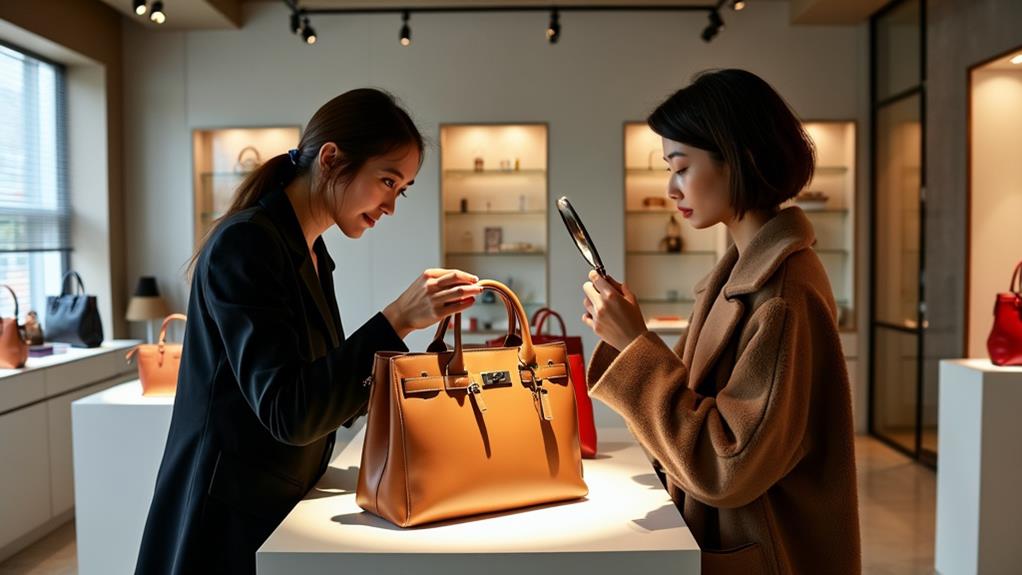
When shopping for Japanese luxury handbags, always inspect the bag's condition for wear and compare prices with similar items. Ensure the seller provides proof of authenticity, such as certificates or detailed images, to confirm legitimacy. Research the brand's reputation and utilize modern technology, like AI-based authentication services, for additional peace of mind.
Ensuring Bag Condition
A keen eye is essential when assessing the condition of a luxury handbag. When shopping for pre-owned luxury bags, check for signs of wear such as tears, loose stitching, and watermarks, as these imperfections can impact both the item's value and authenticity.
Verifying the handbag's condition requires more than just a visual inspection; compare prices with similar bags to ensure you're getting a good deal. The market for second-hand luxury items can vary widely, so thorough research is crucial.
To assist you in your evaluation, follow these steps:
- Inspect Carefully: Examine the stitching, zippers, and interior linings meticulously for any signs of wear and tear.
- Price Comparison: Compare the price with similar pre-owned items to verify you're not overpaying.
- Research Brands: Understand the brand's reputation and resale value to make an informed investment.
- Reputable Sellers: Purchase from trusted sellers who provide proof of authenticity, such as certificates or detailed images.
Japan's stringent regulations against counterfeit goods enhance your protection. By following these steps, you can ensure that your second-hand luxury handbag is both a stylish and savvy investment.
Authenticity Proof Requirements
In Japan, sellers of second-hand luxury bags must provide proof of authenticity, usually in the form of certificates or detailed images. This requirement ensures the legitimacy of the item.
If you're considering a designer handbag or another luxury piece, Japan's stringent regulations against counterfeit goods can bolster your confidence in your purchase.
Pay attention to watermarks and specific design features unique to the brand. These indicators are crucial for confirming authenticity and minimizing the risk of buying counterfeit items.
Additionally, compare prices and check for signs of wear to ensure you're getting both an authentic piece and a fair deal.
Always choose reputable sellers with established authentication processes. Japan's strong commitment to authenticity makes it one of the safest markets for second-hand designer goods.
Research Brand Reputation
Understanding the authenticity proof requirements is crucial for making informed purchases, and researching the brand's reputation is equally important. When exploring the world of luxury designer handbags, particularly from Japan, you can rely on the strict standards set by the Japanese market to combat counterfeit goods.
Reputable sellers often provide certificates or detailed images to confirm the authenticity of their designer items, ensuring you receive genuine products.
To enhance your buying experience, consider these steps:
- Check Seller Reviews: Look for feedback from previous buyers to gauge the seller's reliability and the quality of their secondhand luxury items.
- Verify Certificates: Ensure the authenticity certificates are issued by recognized authorities. Japanese sellers typically include these with their luxury designer products.
- Compare Prices: Evaluate the asking price against similar bags. If a deal seems too good to be true, it probably is.
- Examine Condition: Inspect the bag for signs of wear, watermarks, or stains. These can further authenticate the item, given Japan's strict anti-counterfeit laws.
For both Japanese consumers and international collectors, Japan's stringent regulations and commitment to authenticity make it a trusted market for genuine designer pieces from brands like Chanel and Louis Vuitton.
Bargain Hunting Strategies
When hunting for the best deals on Japanese luxury handbags, start by comparing prices on multiple online platforms such as ZenMarket to find competitive offers.
Focus on sellers who provide authenticity certificates and detailed images to ensure the genuineness of your purchase.
This approach not only helps you secure great bargains but also minimizes the risk of buying counterfeit items.
Comparing Online Marketplaces
Finding the best deals on Japanese luxury handbags can be an exciting adventure, especially when you explore online marketplaces like ZenMarket.
These platforms offer a wide array of pre-owned bags, allowing you to compare prices across multiple sellers and secure some incredible bargains. By shopping online, you increase your chances of uncovering unique vintage pieces that traditional retail settings mightn't provide.
Plus, the competitive pricing on these second-hand luxury bags makes Japan an attractive market for any savvy bargain hunter.
To make the most of your online shopping experience, consider these four strategies:
- Compare Multiple Listings: Always check various sellers for the same handbag to ensure you're getting the best price.
- Look for Vintage Pieces: These can often be found at lower prices and offer unique styles that stand out.
- Utilize Sign-Up Benefits: Platforms like ZenMarket offer perks such as ZenPoints for shipping discounts, helping you save even more.
- Check Global Shipping Options: Ensure the marketplace provides international shipping so you can enjoy your purchase no matter where you are.
Identifying Authenticity Indicators
Securing the best deals on Japanese luxury handbags online is just the beginning; confirming the authenticity of your purchase is equally crucial. When browsing second-hand designer pieces, always scrutinize their condition for any signs of wear, such as tears or loose stitching, to ensure you're making a sound investment.
Authenticity is paramount, so compare prices of similar items to gauge market value and avoid overpaying. Japanese pre-owned bags often offer competitive pricing due to lower import taxes, making them attractive options.
To mitigate the risk of purchasing counterfeit goods, rely on reputable sellers who provide proof of authenticity, such as certificates or detailed images. Look for brand-specific indicators, such as watermarks or serial numbers, which are essential in determining authenticity.
Japan's strict regulations against counterfeits offer enhanced buyer protection, giving you more confidence in your purchase.
Additionally, familiarize yourself with the brand's typical craftsmanship and details. High-quality standards are synonymous with luxury designer products, and well-maintained bags from Japan are likely to reflect this.
Economic Implications
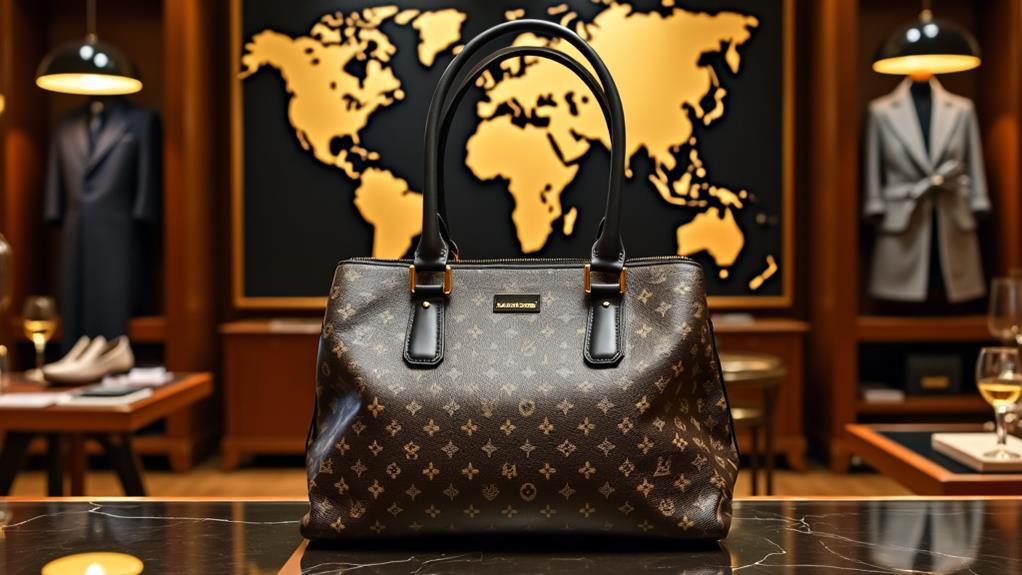
Japan's luxury market, valued at approximately $31 billion in 2022, plays a crucial role in global fashion, exhibiting a notable 27% growth driven primarily by international tourism.
The weak yen has significantly attracted foreign tourists by enhancing their purchasing power, resulting in substantial economic gains. Tax-free shopping has surged, with foreign tourists, particularly from China, doubling their spending and significantly contributing to sales in Japan's luxury sector.
Major luxury brands, such as LVMH, reported a 32% increase in sales, highlighting Japan's economic significance in the global fashion industry. The yen's depreciation has made luxury handbags more affordable for international buyers and has encouraged local consumers to consider second-hand designer options.
Analysts anticipate that the ongoing yen depreciation will continue to influence consumer behavior, sustaining Japan's reputation as a premier destination for luxury shopping.
Key economic implications include:
- Increased Foreign Tourist Spending: Boosts the local economy.
- Weak Yen: Enhances purchasing power for international buyers.
- Growth in Tax-Free Shopping: Attracts more foreign consumers.
- Expansion of the Second-Hand Designer Market: Driven by value-conscious local consumers.
Collectively, these factors underscore the significant economic impact of Japan's luxury market on a global scale.
Conclusion
Japanese luxury handbags have captured the global market with their unparalleled quality, cultural depth, and innovative designs. Emphasizing meticulous craftsmanship and genuine authenticity, these bags have become symbols of reliability and investment worth. With competitive pricing, excellent customer service, and a robust second-hand market, you can now make well-informed decisions. Embrace the fusion of tradition and modernity, and confidently explore the world of Japanese luxury handbags.

